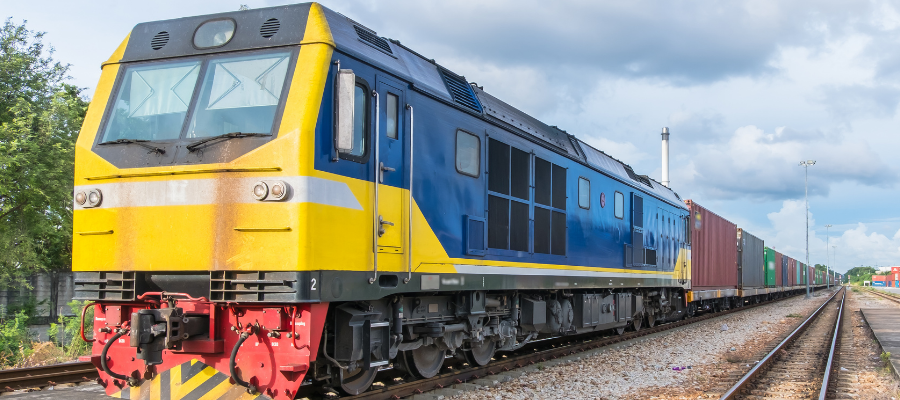🕒 Article read time: 2 minutes
What is in store for rail freight in 2022?

Taken in the round, 2021 could be described as a positive year for rail freight.
With further investment from government into the electrification of the network and Tesco crediting rail for keeping food supplies moving, the role rail plays in supporting the UK’s supply chains has never been more appreciated.
During 2021, rail has proven itself to be both resilient and adaptable as a transport mode, particularly in the face of a crisis. It has supported the UK through various supply chain challenges, notably the HGV driver crisis which saw 96 per cent of UK logistics businesses report problems in September 2021 filling these vital but hard-to-recruit roles.
GREAT BRITISH RAILWAYS
In spring 2021, the government realised its plans to transform the nation’s railways. The Great British Railways: Williams-Shapps Plan for Rail whitepaper contained the proposal to bring the network under single national leadership with the creation of a new public body – Great British Railways (GBR). This is the biggest change to the UK’s railways in 25 years, and one supported by Logistics UK, which has long argued that rail freight has been disadvantaged by complex systems of decision making involving multiple rail bodies. It is expected that the new body, GBR – which will have a statutory duty to promote rail freight to secure economic, environmental, and social benefits for the nation – will ensure freight operators have fair access to the network and will ‘help embed freight firmly into strategic decision making, by incorporating freight into the new 30-year strategy.”
Throughout 2022 and beyond, Logistics UK is looking forward to working with the new GBR and the Department for Transport on the implementation of reform process and awaits with interest the Whole Industry Strategic Plan, set to be published in 2022. Commissioned by Grant Shapps MP, Secretary of State for Transport, it will set out the long-term strategic drivers that ministers will use to hold GBR to account.
COVID-19 PANDEMIC
Rail played a key role in ensuring the timely delivery of essential goods and moving personal protective equipment around the country throughout the COVID-19 pandemic. The rail network was operating at full capacity prior to the pandemic. However, since spring 2020, with the increase in people working from home, the number of passengers reduced significantly; during Q4 of 2019-2020, the total journey numbers dropped by 51 million. This led to an opportunity to increase freight capacity and as the nation manages the spread of COVID-19 in the long term and rebuilds the economy, it is important that freight remains a key consideration.
The Rail Delivery Group’s Value of Rail Freight report (April 2021) revealed that intermodal freight services on some underutilised off-peak passenger routes deliver greater economic value than passenger use.
Mags Simpson, Head of Policy Engagement, Logistics UK, said: “Logistics UK is urging government to heed the report’s findings and allow freight operators access to these lines. All opportunities to maximise rail freight use on the network – when it makes economic and operational sense should be explored.”
DECARBONISATION
Following the UN Climate Change Conference (COP26) in Glasgow, held in November 2021, reducing greenhouse gases has never been higher on the agenda for government, businesses, and citizens alike. The continued decarbonisation of the rail freight industry will be a key focus in 2022, as will the need to shift more freight from the road onto the tracks. 2022 will see the government start further decarbonisation of the Trans-Pennine main line and Midland Main Line, in addition to continued innovation from an array of private companies, including a partnership (announced in November 2021) between train manufacturer Alstom and rail operator Eversholt Rail to build the UK’s first hydrogen train fleet.
“2022 has the potential to be another positive year for rail freight,” Simpson said, “both in terms of policy reform and decarbonisation. Continued investment into infrastructure to release capacity and driver efficiencies, is vital to grow its use and ensure long-term sustainability. Transport connectivity between the nations is crucial too: we are pleased to see that the Union Connectivity Review, published in November 2021, includes a recommendation to improve connectivity to sea ports across the UK by enhancing rail freight connections and maximising the potential of freeports by investing in improved connectivity to and from these economic hubs.
“Throughout 2022, Logistics UK will continue to act as the voice of the industry, working closely with its members, government and stakeholders to maximise the use and value of this crucial transport mode.”
*www.logistics.org.uk/rail
Published On: 03/02/2022 16:00:00

Comments Section
If you are a Logistics UK member login to add comments.